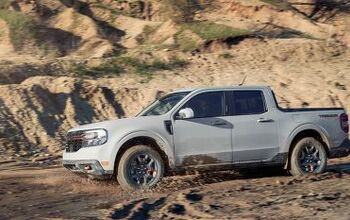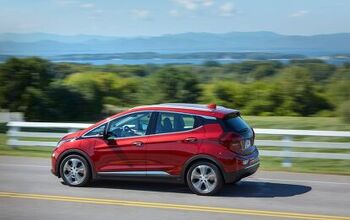Suzuki Autos, Alive And Well In Canada
American Suzuki Motor Corp may have gone bust, but Suzuki cars will continue to be sold in Canada, where the SX4, Kizashi and Grand Vitara are still offered (but not the Equator pickup).
Suzuki Canada’s Bill Porter confirmed to The Globe and Mail that Suzuki cars would continue to be sold here, despite the U.S. shuttering their operations. Suzuki Canada is independent of the American Suzuki Motors, the Globe quotes Mr. Porter as saying the Suzuki’s vehicles play better in Canada than the United States.
Mid-sized vehicles represent a bigger segment of the U.S. market than the Canadian market, which, because of higher gas prices than the United States, is more skewed to the smaller vehicles Suzuki produces.
“The product mix is very different,” Mr. Porter said in a telephone interview. “We’ll continue to operate in the usual manner.”
Now that Canada will go it alone with Suzuki sales, it’s worth looking at a snapshot of the brand, and where it stands in the Canadian market.
The SX4 remains a best-seller for Suzuki Canada, outselling the Ford Flex, Buick Regal and Honda Fit in 2011. The Grand Vitara outsold the Hyundai Genesis, Acura TSX and Mazda MX-5. While the Kizashi is a non-entity in Canada, the all-wheel drive vehicles do have a following due to Canada’s climate.
While Canadians love smaller, fuel-efficient vehicles, Suzuki products are neither cheap nor particular miserly when it comes to fuel consumption. The Grand Vitara range starts at $26,995, $1,000 more than a Subaru Forester (Subaru being one of the most popular imports in the Canadian North) and Subaru’s dealer network and reputation and undoubtedly superior to Suzuki. AWD variants of the Ford Escape and Honda CR-V are $1-$2,000 more on average, and Canadian buyers clearly have no problem paying the difference. The AWD Grand Vitara gets about 20 mpg combined, while a Forester gets 23 mpg and a CR-V manages 25 mpg combined.
The all-wheel drive SX4 is billed as “Canada’s most-affordable crossover”, and at $20,795, it’s $100 cheaper than a poverty-spec Impreza, which is as much a “crossover” as the SX4. A front-drive sedan SX4 can be had for $15,495, cheap for Canada, but still pricier than a base model Kia Rio. Fuel economy for the AWD versions is around 25 mpg combined, while the Impreza manages between 28 and 30 mpg. The Rio, even with its newly adjusted rating, manages 32 mpg.
The big question mark, naturally, is future product. Canadian and U.S. divisions are often given identical product due to the cost of certifying them for sale in North America, the near identical certification standards and the overlapping tastes of Canadian consumers. But without America to worry about, Suzuki Canada has a good shot of offering some very compelling product to Canadian consumers.
Vehicles like the Swift, which has been universally acclaimed by the automotive media in Europe, would be a good start. The Hungarian-built Swift is immune from being hamstrung by a high yen, and looks fresh and attractive. Presumably, its build quality and driving dynamics are enough to win it praise from notoriously fickle European outlets, and Suzuki doesn’t have to worry about its hatchback-only body style or diesel powertrains – Canadians are much more receptive to these configurations than American consumers. The gasoline engines will likely need to be upgraded, as a 1.2L 96 horsepower gasoline engine is inadequate for our roads, but the Swift Sport’s 1.6L 136 horsepower engine will do just fine.
Whether Suzuki brings smaller cars to Canada is up in the air. The auto journalist in me wants to say yes, while the business-minded skeptic side leads toward no. However, Suzuki has previously displayed the Ignis subcompact and even the Wagon R kei car at Canadian auto shows in the past. Mitsubishi is bringing the Mirage to Canada, while Chevrolet is already selling to Spark here, but both are built in low-cost countries (Thailand and India respectively), while the Alto is built in either Japan or India – and Indian exports seem unlikely at this time. We emailed Suzuki about this (at an admittedly late hour) and are awaiting their comment.
While Suzuki sales were down nearly 40 percent last year compared to 2010, they’ve been slowly crawling back; sales were up one percent year-to-date in 2012, though nowhere near previous levels. Suzuki sold 5625 cars in 2011, down from a recent high of over 13,000 cars in 2008. But in the last four years, the quality of new vehicles on sale in Canada has risen markedly. The Hyundais, Kias and even domestic cars of 2008 have come so far in 4 years that Suzuki will have to make a serious effort product-wise to gain traction in the marketplace. The good news is that Canadian consumers are more open-minded to type of vehicles that Suzuki sells, and they’ve yet to abandon Suzuki wholesale. The company’s decision to stick with Canada should be applauded. Hopefully they get what they need product-wise to see it through.
More by Derek Kreindler
Latest Car Reviews
Read moreLatest Product Reviews
Read moreRecent Comments
- 3-On-The-Tree My 2009 C6 corvette in black looks great when it’s all washed and waxed but after driving down my 1.3 mile long dirt road it’s a dust magnet. I like white because dust doesn’t how up easily. Both my current 2021 Tundra and previous 2014 Ford F-150 3.5L Ecobomb are white
- Bd2 Would be sweet on a Telluride.
- Luke42 When will they release a Gladiator 4xe?I don’t care what color it is, but I do care about being able to plug it in.
- Bd2 As I have posited here numerous times; the Hyundai Pony Coupe of 1974 was the most influential sports and, later on, supercar template. This Toyota is a prime example of Hyundai's primal influence upon the design industry. Just look at the years, 1976 > 1974, so the numbers bear Hyundai out and this Toyota is the copy.
- MaintenanceCosts Two of my four cars currently have tires that have remaining tread life but 2017 date codes. Time for a tire-stravaganza pretty soon.


































Comments
Join the conversation
Looks like they're taking a page out of Studebaker's playbook, hope it works out better for them, the Kizashi and SX4 deserve better.
How can they future R & D while just selling in Canada and meet NHSTA & CA emissions generalized by Ottawa?